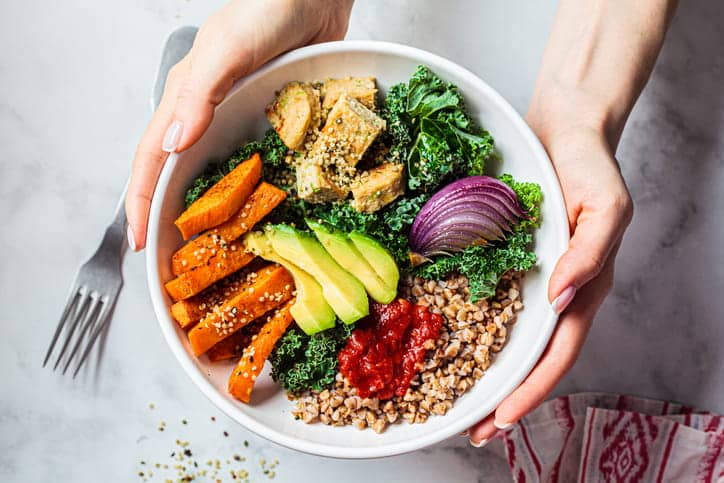
Why Senior Nutrition Matters
The food we eat is quite literally what our bodies are made from. The importance of nutrition for seniors in overall health and quality of life cannot be overstated. While younger people may be more easily able to bounce back from a poor diet, as we age, nutrition becomes increasingly important for mobility, independence, and quality of life.
A proper diet can also help prevent chronic conditions, like heart disease, obesity, and even protect bone and joint health.
At Haven Health, we’ve made a commitment to promote healthy eating and senior wellness in all of our facilities throughout Arizona. Whether in short-term rehabilitation or long-term care, you can be certain that when you choose Haven Health, you’re choosing the best nutrition in the state.
Contact Haven Health for more information on all of our offerings for seniors
Key Elements of Healthy Nutrition for Seniors
As we age, our dietary needs change. The food intake and composition for a healthy 18-year-old may be significantly different for someone in the twilight of their life. As we grow older, our metabolism slows, muscle mass decreases, and nutrient absorption often becomes less efficient.
For seniors in particular, it’s important to eat a balanced diet of whole foods consisting of balanced food groups, such as proteins, whole grains, fruits, vegetables, and healthy fats. Eating a balanced diet can help slow muscle loss, support digestion, and keep our organs healthy, especially our heart.
As seniors think about their nutrition, don’t forget about hydration. Seniors often need more hydration than younger people due to loss of efficiency over time in the systems that process water and cool the body. Men should drink 13 cups of water per day, and 9 cups a day for women aged 51 and older.
Healthy Food Choices That Support Senior Well-Being
Good nutrition isn’t about restrictive diets, cutting whole food groups from your meals, or eating at certain times a day. It’s about eating smart.
The benefits of a diet rich in fruits and vegetables cannot be overstated, and these foods should make up the bulk of your diet, if possible. Fruits and vegetables help boost immunity, give your body all the micronutrients it deserves, aids digestion, and reduces inflammation.
You should also aim to choose nutrient-rich options for bone, muscle, and heart health. These are most often defined as “whole foods,” such as carrots or bread, not ultra-processed things you may find in the center aisles of grocery stores.
While you don’t need to cut certain foods from your diet completely, there are some you should limit. These include foods that contain excess sugar, sodium, and foods that are highly processed, such as pre-packaged and fast food.
Lifestyle and Activity Support
Good nutrition and physical activity go together like peas and carrots. Part of an overall healthy lifestyle includes being physically active.
Together, diet and exercise support energy, mobility, and independence. Seniors should aim to get at least 150 minutes of moderate activity per week.
Some activities that can lead to a healthier lifestyle include:
- Walking or hiking
- Swimming or water aerobics
- Yard work
- Dancing
- Physical therapy
- Yoga or Tai Chi
- Bike riding
- Stretching
The most important thing is that you move every day. At Haven Health, we always encourage light physical activities through classes, different forms of therapy, and fun outings.
Preventing Chronic Illness Through Diet
Our diets are also closely related to risks to our organs and other chronic illnesses. A healthy diet full of fiber, fruits and vegetables, vitamins and minerals, and lean protein lowers the risk of heart disease, diabetes, and osteoporosis.
Eating healthy is also a powerful way of managing these conditions. Low sodium diets help control blood pressure, avoiding processed sugars can help with diabetes, and calcium is good for our bones.
Along with a healthy diet, you should also receive regular health screenings. These screenings can help you understand any growing problems before they become chronic, and manage any conditions that you may have.
Nutrition and Services for Seniors at Haven Health
At Haven Health, we like to think we offer the best nutrition services for seniors anywhere in Arizona. For all of our patients, we provide personalized meal planning and dietary support. Because every senior has differing goals and health needs, we’ll always discuss diet with you and your loved ones before making any decisions.
Our dining halls and other foodservice offerings always serve fresh, balanced meals, designed around seniors’ needs. Many of our residents appreciate not just how healthy our food offerings are, but also how tasty.
And last but not least, Haven Health encourages not just healthy food choices, but social dining experiences as well. You’ll never eat alone when you choose Haven Health.
For the Healthiest Elder Care Services in Arizona, Contact Haven Health
The benefits of prioritizing senior nutrition are many — you can avoid or combat chronic conditions, such as diabetes and heart disease, eating healthy protects seniors’ mobility and independence, and a healthy lifestyle often translates to a happier one, especially in our golden years. When you eat better, you feel better.
Haven Health is committed to the goal of healthy living for all of Arizona’s seniors. We not only provide health-conscious foods to our residents, we help our residents enjoy healthy foods and lifestyles. At Haven Health, being healthy doesn’t mean no fun.
If you’re looking for senior care in Arizona, or have further questions, contact us today to learn more about our senior care and nutrition services.
Contact Haven Health for more information on all of our offerings for seniors
Sources:
Foods that Fight Inflammation. (2024).